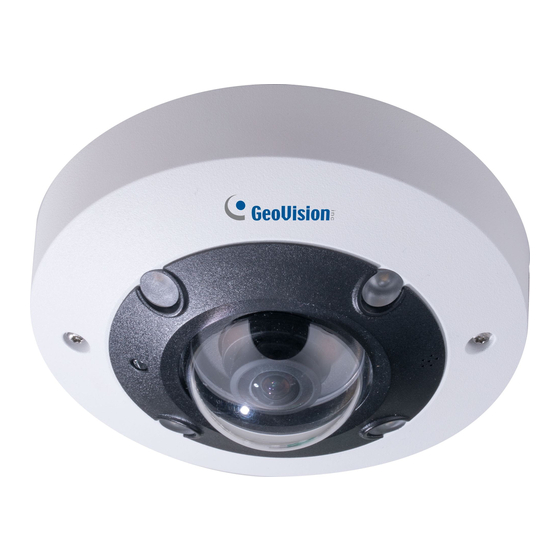Summary of Contents for GeoVision GV-QFER12700
- Page 1 Quick Start Guide GV-QFER12700 Before attempting to connect or operate this product, please read these instructions carefully and save this manual for future use. QFER-QG-A...
- Page 2 GeoVision. Every effort has been made to ensure that the information in this manual is accurate. GeoVision, Inc. makes no expressed or implied warranty of any kind and assumes no responsibility for errors or omissions. No liability is assumed for incidental or consequential damages arising from the use of the information or products contained herein.
-
Page 3: Table Of Contents
Contents Note for Connecting to GV-VMS / DVR / NVR ..............ii Note for Recording ......................ii 1. Introduction ........................1 1.1 Packing List ..........................1 1.2 Overview ..........................1 1.3 Wire Definitions ........................2 2. Installation ........................3 3. Connecting the Camera ....................5 3.1 Power Connection ........................ -
Page 4: Note For Connecting To Gv-Vms / Dvr / Nvr
Note for Connecting to GV-VMS / DVR / NVR The GV-QFER12700 is designed to work with GV-VMS / DVR / NVR, a video management system. Note the following when the camera is connected to GV-VMS / DVR / NVR: Once the camera is connected to the GV-VMS / DVR / NVR, the resolution set on the GV-VMS / DVR / NVR will override the resolution set on the camera’s Web interface. -
Page 5: Introduction
Introduction 1. Introduction Welcome to the GV-QFER12700 Quick Start Guide. In the following sections, you will learn the basic installations and configurations. For a detailed user manual, see the GV-QFER12700 User’s Manual. 1.1 Packing List • GV-QFER12700 • Self-Tapping Screw x 3 •... -
Page 6: Wire Definitions
1.3 Wire Definitions Description Audio In (Pink) Audio Out (Green) 4-Pin Alarm I/O Terminal Block Power (DC 12V) RJ-45 / PoE... -
Page 7: Installation
Installation 2. Installation In this chapter, you will learn how to install GV-QFER12700 with standard package. Required Items Tool for drilling a hole on the ceiling (user-prepared) M4 Crosshead Screw Driver (user-prepared) SD card (user-prepared) Loosen the two screws on the dome cover with the supplied torx wrench, and remove the dome cover by pulling it apart from the camera. - Page 8 Note: GV-QFER12700 can be installed to the wall or ceiling with GV-Mount206-1 / 903-2 / 904-2 / 912-1 / 919. Refer to the following sections and documents. • GV-Mount 206-1 (5.4.2 GV-FER5701 / FER12203 / FER12700 / EFER3700 / EFER3700-W / QFER12700, GV-Mount Accessories Installation Guide) •...
-
Page 9: Connecting The Camera
Connecting the Camera 3. Connecting the Camera 3.1 Power Connection To power up the camera, choose one of the following options below. Connect the DC 12V power adaptor (optional accessory) to the power connector of the camera and the power outlet. Connect an Ethernet cable to the RJ-45 connector of the camera and a GV-PA191 PoE ... - Page 10 Insert the cable into the RJ-45 plug. Assemble the waterproof rubber set. If the DC cable is not in use, you can waterproof it by inserting the supplied plug into the DC interface. DC interface Plug...
-
Page 11: Accessing The Camera
Accessing the Camera 4. Accessing the Camera 4.1 System Requirements Once installed, your camera is accessible over the network. Make sure your PC has good network connection, and meet the following requirements: Operating System Windows 7 or later Memory Minimum: 4 GB Recommended: 8 GB Minimum: Intel Core i5-2430M, 2.4 GHz Recommended: Intel Core i7-870, 2.93 GHz... -
Page 12: Looking Up The Dynamic Ip Address
4.2 Looking Up the Dynamic IP Address By default, when the camera is connected to LAN with a DHCP server, it is automatically assigned with a dynamic IP address. Follow the steps below to look up its IP address and set up a login password. -
Page 13: Configuring The Ip Address
6. Type the username admin and your password. Click Login. 4.3 Configuring the IP Address By default, the GV-QFER12700, connected to LAN without a DHCP server, is assigned with a static IP address of 192.168.0.10. Follow the steps below to assign a new IP address to avoid IP conflict with other GeoVision devices. -
Page 14: The Web Interface
5. The Web Interface 5.1 Viewing Live View Video Once you log in the Web interface, you will see the live view as shown below. Name Function Video Quality Show or hide the bitrate and compression of each stream. Display in full screen mode. Full Screen Talk Turn on... - Page 15 Note: No. 11 and 12 varies based on the type of Installation selected in Fisheye Setting. For details, see Step 3 in 2.4.11 Fisheye Setting, GV-QFER12700 User’s Manual.
-
Page 16: Upgrading System Firmware
2. In Step 1, click the Browse button to locate the firmware file saved at your local computer. 3. In Step 2, select the type of the firmware file. 4. In Step 3, click Upgrade. Note: See details in 2.2.16 Software Upgrade, GV-QFER12700 User’s Manual. -
Page 17: Restoring To Factory Default
If for any reason the camera is not responding correctly, you can restore the camera to its factory default settings using the Web interface. 1. Select System at the top > Factory Default. This page appears. 2. Select Full Restore, Partial Restore, or Reboot. Note: See details in 2.2.14 Factory Default, GV-QFER12700 User’s Manual.

















Need help?
Do you have a question about the GV-QFER12700 and is the answer not in the manual?
Questions and answers